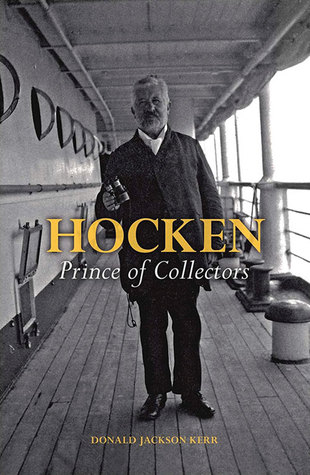Finally, a really dense, in depth examination of one of New Zealand’s greatest bibliophiles. Kiwis it seemed started publishing very early in the life of the Colony. Not surprisingly, our desire to document and recors, to measure and observe and, of course, express our mind was pretty keen from the get-go. And it’s collections like that at Otago’s Hocken Library that pay a unique tribute to that fact. On my bookcase sits Taschen’s 1001 Books You Must Read Before You Die. I reckon the collection of Dunedin Dr T. M. Hocken would be well over that number. He arrived in Dunedin in 1862, aged 26 and started collecting almost immediately. His collections were vast and specialised, Over about 48 years he’d amassed a huge set of books, manuscripts, pamphlets, maps and sketches on common and rare details of New Zealand’s early history, which he kept at his house “Atahapara” on Moray Place, Dunedin. His original focus was Captain Cook and early exploration narratives of the Reverend Samuel Marsden and his contemporaries; Edward Gibbon Wakefield and the NZ Company; histories of the South; early Maori encounters; and general writing on early NZ’s early histories in general. There are also wonderful maps from Colenso’s expeditions and other early artefacts.
Hocken had two main contemporaries in book collecting: Governor George
Grey and Alexander Turnbull. Biographer
Don Kerr has done a magnificent job not
only documenting the life of Thomas Hocken but he also provides insights into
the intimate life of the man and offers some profiling on the particular difference
between these collectors and their particular collecting habits and drive. For instance, in the forward Kerr notes that
Turnbull was “interested in books as object.
He had them bound and embellished in London by the superstar craftsmen
of the day and built a collection about the history of the book and book arts
around them.” Kerr suggests that Hocken
took a different approach: “...a far more practical approach, developing a
collection primarily as a database to use in e was also a proper book nut: a
bibliographer. His first work on the
subject was A Bibliography o the Literature relating to New Zealand (pub July
1909). It was one of his many
talents. He was a father, an explorer
and a pioneering doctor in the South.
He was well respected in Dunedin and in New Zealand being
employed for a range of unique roles for the colony’s early endeavours. For instance in 1898 Hocken, Kerr tells us, became a commissioner of the Otago Settlement
Jubilee Exhibition, marking 50 years of the province's settlement. A few year’s
later, in 1903, he travelled to Japan, Greece, Egypt, and Great Britain to
conduct his own archaeological and historical research and whilst in Britain,
he collated documents relating to the New Zealand Company and New Zealand
Mission which he brought back to New Zealand.
It’s because of Hocken that we know so much about Marsden and Wakefield and
managed to secure a large number of them and bring them back to New
Zealand. And he continued to be an
educator and promoter giving lectures on a vast range of topics, researched
from his collection. One in particular,
Kerr reminds us, was The Letters and
Journal of Samuel Marsden, now regarded as a pivotal work on the man.
And it all continued throughout his life. In 1010, at his funeral, the entire of
Dunedin turned up to pay respect and not long after the pressure went on to
bring the vast collection under the wings of the Otago University. The Hocken Library became a legacy, valued
well beyond any money. Early leaders William
Pember Reeves saw the value in this amazing archivist and his collection.
Kerr has fully detailed not only Hocken’s life (b.1836-d.1910)
but his collecting activities, and more importantly his legacy to the
intellectual and cultural development of our country. The notes, footnotes and index must be at least
¼ of this 424page tome. They also
include a range of colour plates, photos and images that illustrate the
collection, the times and the topic. Kerr’s
own bibliography for this work is over 30 pages alone! But there’s also plenty of leads for anyone
wanting to explore individual books or writings. This has a massive vault of breadcrumbs for
both professional and amateur researchers to follow – just like Hocken intended,
I think.
And there’s no doubt that Kerr’s the right book geek to make all
this happen. He’s the Special
Collections Librarian and the co-director at the University of Otago’s Centre
for the Book. He’s studied Grey and
intellectuals like, Henry Shaw Frank W. Reed and Esmond de Beer and he’s
already embarking on another project – 12 contemporary Kiwi bibliophiles. Kerr’s created a book that is more than a
biography or a Uni text – it’s a starter for research that could be a catalyst for
your own private collection. Perhaps it’s
a taster to hunt out a few documents at your local antique shop, or to pay more
attention during The Antique’s Roadshow.
But a final question I have for Kerr, as I write this, is this: In the digital age, without the need for bookshelves
how will the bibliophiles of the future collect and what will that be. Is the love of books the same as a love of
reading? Can our personalities and
heritage still be conveyed in what we choose or choose not to read and
store? In other words do libraries and
book collections still matter? What do
you think?



